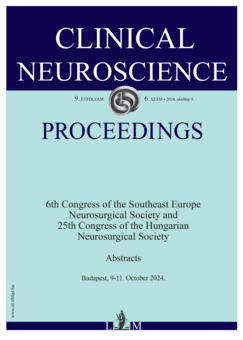Enduring effects of the COVID-19 pandemic on transforming traumatic brain injury management: Lessons learned from Croatian experience
BRUNO Splavski1,2
2024. OKTÓBER 09.
Ideggyógyászati Szemle Proceedings - 2024;9(6)
BRUNO Splavski1,2
2024. OKTÓBER 09.
Ideggyógyászati Szemle Proceedings - 2024;9(6)
Szöveg nagyítása:

Introduction: The outbreak of COVID-19 has significantly impacted emergency neurosurgery practice in Croatia, especially for traumatic brain injury (TBI). Herein, we identify the enduring effects of the COVID-19 pandemic on transforming TBI management. It is an institutional analysis of the COVID-19 pandemic’s impact on TBI treatment, based on lessons learned from Croatian experience.
Methods: During 2020, we examined hospital-admitted TBI patients for eight months dividing the observed time intervals into pre-lockdown, lockdown, and post-lockdown periods. Independent variables like gender, age, and severity of the injury, were analyzed using descriptive statistics. The Mann-Whitney U test, Chisquared test, or Fisher’s exact test were used to compare surgical and non-surgical TBI patients and the cause, multiplicity, and type of injury in correlation to the time intervals observed.
Results: The number of surgical TBI patients, the mean age of admitted patients, and the frequency of isolated, and moderate injuries including chronic subdural hematoma, were significantly decreased during the lockdown and post-lockdown periods, when the trend towards diminishing lethal outcomes was also observed.
Conclusion: The COVID-19 pandemic has intensely transformed the patterns of TBI in Croatia, strongly influencing patients’ selection, management, and outcome, forcing neurosurgical service to quickly readjust to the emerging new condition. The experiences gained during the pandemic present an opportunity to improve organizational structure and patient care as neurosurgical activities resume. Specific protocols for COVID-19-positive and COVID-19-suspected TBI patients should be designed to better adjust neurosurgical capability and capacity and minimize the risk of disease transmission among patients and medical personnel.
Ideggyógyászati Szemle Proceedings
Despite evidence based institutional protocols being in place in many countries, aneurysmal subarachnoid hemorrhage (SAH) continues to be a major socio-economic burden with many open questions remaining regarding the optimal management of the affected patients.
Ideggyógyászati Szemle Proceedings
Arteriovenous malformation (AVM) is an anomaly of blood vessel formation. Numerous models have been established to understand the nature of AVM.
Ideggyógyászati Szemle Proceedings
Additive manufacturing has gained significant traction in industrial applications due to its high potential when it comes to manufacturing objects with complex geometry.
Ideggyógyászati Szemle Proceedings
Not only other surgical and robotic fields, but minimally invasive procedures in spine surgery have undergone significant development in recent times. A demand emerged from both surgeons and patients to develop and perform these types of surgeries in order to prevent biomechanical and surgical complications.
Ideggyógyászati Szemle Proceedings
Functional magnetic resonance imaging (fMRI) is crucial for presurgical language mapping in neurosurgery, helping identify eloquent brain regions to preserve during operations. Effective language mapping depends on advanced fMRI acquisition and detailed data analysis to ensure accurate clinical outcomes.
Lege Artis Medicinae
Ilyenkor, karácsony előtt, az év végén szokás egyfajta számadást készíteni, visszanézni az elmúlóban lévő év történéseire és előretekinteni az elkövetkező esztendő várható kihívásaira. Persze, jó volna, ha ez szép, méltó, békés, előremutató stb. lenne...
Lege Artis Medicinae
A részt vevő orvosok ismeretei szerint még soha nem végeztek Magyarországon Apert-szindrómás egypetéjű ikerpáron kézrekonstrukciós műtétet, amelynek során mindkét kéz összes ujján szétválasztották és kialakították az összenőtt ujjaikat. A több évig tartó operációsorozat Hetthéssy Judit kézsebész, és dr. Kassai Tamás kézsebész, a dr. Manninger Jenő Baleseti Központ osztályvezető főorvosa vezetésével zajlott.
Lege Artis Medicinae
Kapócs Gábor a LAM főszerkesztőjeként beszélgetett a MOK újonnan megválasztott és a minap leköszönt elnökével az előző ciklus tapasztalatairól és a MOK új vezetése előtt álló új kihívásokról, a kitűzött célokról.
Lege Artis Medicinae
A Nobel Alapítvány bejelentette, hogy sok magyar várakozásának, reményeinek megfelelően Karikó Katalinnak és Drew Weissmannek ítéli az idei orvosi és fiziológiai Nobel-díjat, a Covid-oltásokat megalapozó módosított mRNS-technológia kifejlesztéséért. Duda Ernő virológussal, a Szegedi Tudományegyetem Szent-Györgyi Albert Orvostudományi Kar emeritus professzorával beszélgettünk a díj hátteréről.
Az elmúlt hónapokban sokat és sokszor hallunk a mesterséges intelligenciáról, itt, a LAM Mesterséges intelligencia rovatában is. A terület fontosságát mutatja, hogy az MTA két (számunkra releváns) tudományos osztálya, akadémikus elnökeik, Ádám Vera és Lénárd László vezetésével 2023 novemberében konferenciát szervezett, ahol a hazai kutatásokról, gyakorlati eredményekről hallottunk érdekesebb beszámolókat.
Increased utility of telemedicine in neurosurgery - The COVID-19 effect
A COVID-19 hatása a rohamokra és a viselkedésre epilepsziás betegeknél
1.
2.
3.
4.
5.
Egészségpolitika
Hadiállapotként kezeli és így is reagál a kormány az egészségügy „rendezésére”1.
2.
Orvoslás és társadalom
Országos férfiegészség-kampány és PSA-szűrés indul a prosztatarák ellen3.
4.
5.